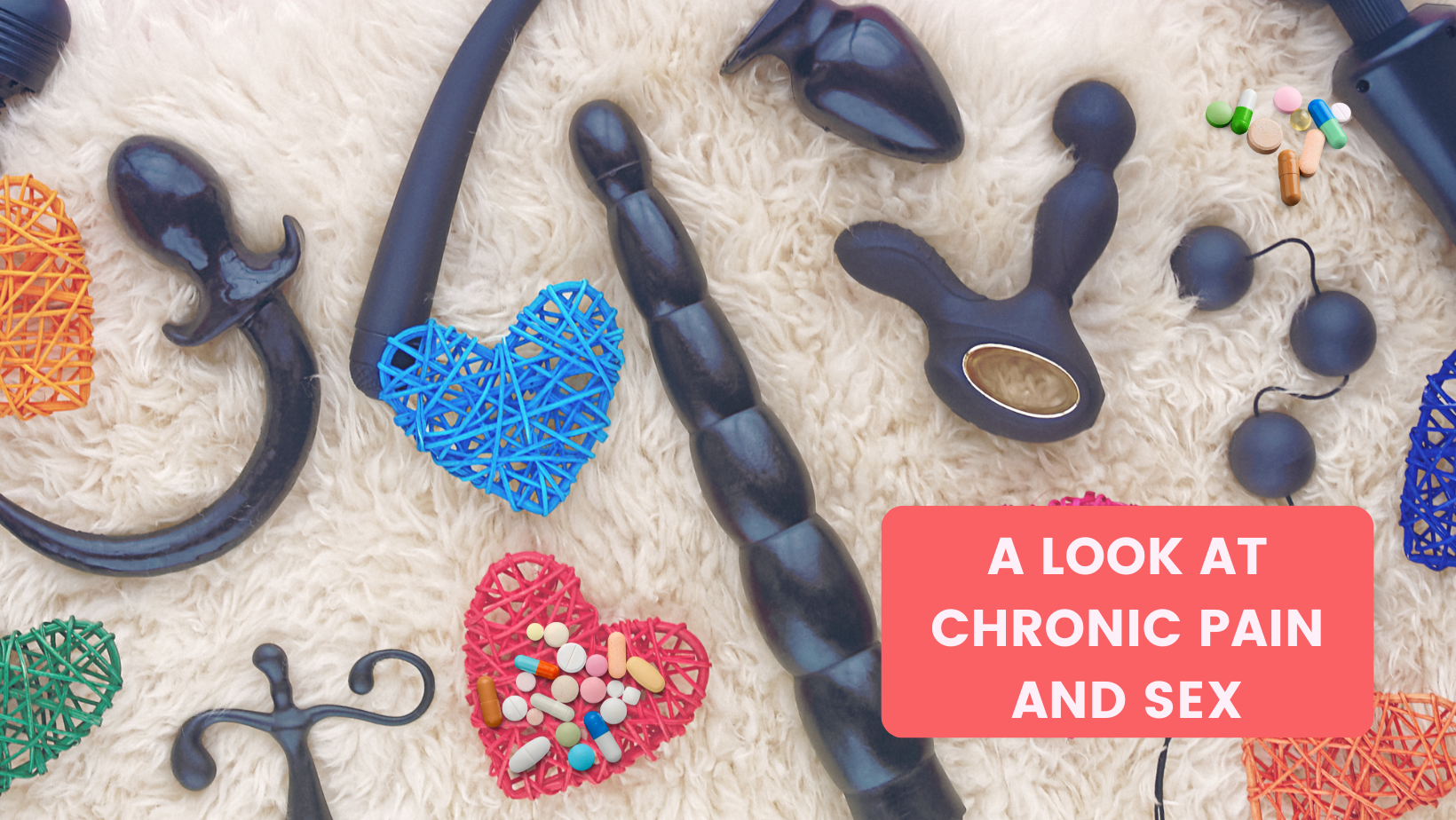How to Cope With Chronic Pain During Sex

It’s true that sometimes painkillers can make sex less enjoyable, but it’s also equally true that they can help sex be pleasurable.
It’s also true that some types of pain can make sex pleasurable and other types can act in the opposite direction. This is why, when encountering chronic pain and sexual enjoyment, we need to take a nuanced approach and understand the following:
- Not all types of pleasure are equal for everyone.
- Sometimes painkillers can dampen sexual enjoyment.
- But, sometimes they are needed so we can focus on sexual pleasure.
- Painkillers can sometimes bridge the orgasm gap, but equity is needed when it comes to accessing the right type of pain relief needed.
- This means a better understanding of both painkillers and holistic approaches is needed, as sexual pleasure is fluid and changing, just like how pain presents differently daily too.
How does unwanted chronic pain affect sexual pleasure?
Unwanted pain can lead to a lack of motivation and this can affect our libido meaning we’re less likely to seek out pleasure. This is when mindfulness may be beneficial as it can help form a new understanding of sensations and troubleshoot the lack of motivation when it comes to pleasure-seeking activities. Communicating with your sexual partner can also help increase sexual motivation due to how it releases feel-good hormones such as endorphins and oxytocin.
Pleasure and pain are both active in the same area of the brain and when receiving intense unwanted pain it will take priority over sexual pleasure and turn off pleasure responses. This also means that when we experience orgasm it can trigger pain afterwards as the overriding focus on pleasure suddenly plateaus and then stops, allowing awareness of the pain that was going on in the background.
If pain is linked to inflammation then it can sometimes affect how the nerves of pleasure areas respond due to how they can aggravate them and even stop them from responding correctly to touch stimulation. Inflammatory pain can also affect the neural pathways that are linked with sexual desire and libido. Inflammation can also put us in a heightened sense of fight or flight which can make it harder to relax into consensual sexual pleasure with another, meaning we can struggle to find sex pleasurable and even experience sexual anxiety triggered by internal psychical inflammation.
Trauma from pain or the reasons behind the pain can also affect how we experience sexual pleasure. Social pain is also processed in the same area of the brain as pleasure, so when we experience something that causes emotional distress it can heighten negative pain and reduce our perception of pleasure. Some painkillers can also reduce social pain and anxiety.
A look at how consensual pain can increase it
The biopsychology and social psychology of consensual pain are very interesting because as soon as we introduce consent, pleasure becomes easier to feel. This counts for both vanilla and kink sex, but helps explain why consensual pain can lead to further pleasure as consent itself actives the pleasure area of the brain.
Not only does consent help, but pain can also release endorphins, norephedrine, oxytocin and serotonin, and other feel-good feelings. (these hormones can also act as pain relief too, for those who enjoy consensual pain such as BDSM!). This helps us feel close to our sexual partners and can make us relax more to feel and appreciate consensual pain stimulation.
Why some pain killers many alter pleasure for better or worse
Depending on the pain relief being prescribed, various painkillers can affect sexual pleasure differently. This is only a very basic overview, as there’s so much more that can be expanded in this area.
There are a few painkillers that can target the nerve receptors and make them become numb and some individuals may find these make it feel harder to feel stimulation from touch. Vibrators may be helpful for those experiencing a numbing effect from painkillers.
Antidepressant-focused painkillers may lead to a change in hormones that are involved in sexual pleasure. Serotine whilst it can be amazing, too much of it can turn off our orgasmic response and make it harder to reach orgasm. Again adding mindfulness and new outlooks on sexual pleasure can help here.

image: Comments on Antidepressants and Sex by Ness Cooper In March Diva Magazine 2022
Opioid-based painkillers affect hormones in the hypothalamic-pituitary-gonadal pathways which can be important when it comes to libido and wanting sex. Due to opioids affecting the LH hormone too, they can also alter menstrual cycles which may affect ovulation and a person’s normal monthly rhythm of increased sexual libido and drive.
Although even painkillers may alter an individual’s reaction to sexual pleasure, they may still be needed so someone can actively take part in sex. Painkillers help many individuals perform day-to-day activities, and sex is a normal day-to-day activity that involves the body physically alongside the complexities of the mind.
Many individuals will be prescribed a mixture of different forms of pain relief, and some may find timing different types differently will affect their sexual libido and enjoyment differently.
Whilst pain relief can have some negative effects on sexual pleasure, there are often more pros than cons to taking it if prescribed. Some pain relief medications also reduce further damage to the body’s structure and help stabilize pain as they reduce the chance of further injuries from chronic disease and illness.
Some pain relief can also change how long it takes someone to orgasm. Certain medications can also affect how much natural lubricant someone produces, and may mean they would benefit from adding lubricant to their sexual play.
The importance of learning holistic methods too
When painkillers are needed to make life comfortable and manageable, it’s important to be aware of holistic methods that may help, as pain, sexual pleasure and enjoyment are all fluid. Some days we have more pain and other days we can have more or less sexual desire and libido.
Learning methods such as mindfulness can help understand and train the body to be aware of other forms of pleasure that can turn us on. Sex and sexual enjoyment aren’t just penile and vaginal, our bodies are adaptive and can learn to enjoy and notice other forms of stimulation as pleasurable. Also, when it comes to sex, there are multiple senses that are activated and mindfulness helps bring awareness to the ones we aren’t always aware of that are often playing an important role in the background of sexual excitement and enjoyment.
Exercise can also help boost feel-good hormones which can also make us want to explore other pleasurable activities such as sex.
There is some evidence that some individuals experience less chronic pain by changing to an anti-inflammatory diet, but this should only be done with the support of a healthcare provider. Food can have a systematic role in pain but its effects vary from individual to individual.
The cycle of more pleasure = less pain = more sexual pleasure in the future
The good thing about pleasure, is that we can teach our body to become more responsive to it. If you’re having to take painkillers and finding that they too affect how you experience pleasure, you may find focusing on trying to enjoy sex more can help you slowly enjoy it more. It’s the “use it” or “lose it” approach and it’s true, that the more we engage in sex, the easier we can find it to enjoy the pleasurable aspects of it. Also, when we do eventually reach pleasure it releases lots of feel-good hormones that can override pain and motivate us more to want to have more sexual pleasure in the future.
You can read about How Orgasms Can Reduce Pain over on Glamour magazine which is an article I helped with.
Chronic pain can also increase when we are tired, hungry, and thirsty! So when taking your painkillers, make sure you’re also keeping up with a balanced diet, fluids, and rest to hopefully help you towards orgasmic success.
How Can Therapy or Coaching Help With Chronic Pain and Sexual Pleasure?
Therapy can help individuals understand their pain levels more and become mindful of how to bring awareness to other sensations. It can help individuals work through any barriers they are encountering that may cause additional blocks to pleasure, so not just looking at how pain and pleasure interrelate but the bigger and more individual picture of what’s really going on.
Not only can coaching and therapy help an individual work through how pain may affect their sex life, but it can also give the individual the tools needed to help communicate their sexual pleasure needs and desires.
Whilst we may think it’s pain or painkillers affecting our sex life, there may be other things that are affecting it too. These may need exploring before someone can understand the psychological and psychical side to pleasure that’s unique to them.
Sex coaching can also teach other sexual methods and bring awareness to tools that an individual may benefit from that can help make sex less painful. If you want to explore how chronic pain affects your sex life and learn how to expand your understanding of sexual enjoyment, you can contact me via my email address found here.
